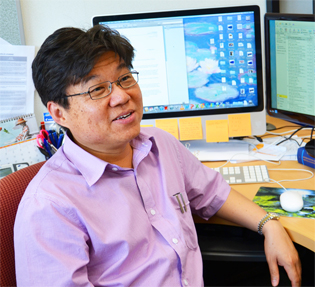Young Children’s Voices in Mathematical Problem Solving
Contributed by Dr Ho Siew Yin and Sng Wei Qin Abbie, from NTUC First Campus, for SingTeach Virtual […]
Read More
We often think of learning in terms of subjects, defined by disciplinary boundaries, and knowledge as a constant body of facts, defined by the curriculum. These assumptions are being challenged and redefined in today’s rapidly changing environment.
 Professor David Hung is keenly interested in the science behind learning. He believes that the way we view learning must change as we face the future.
Professor David Hung is keenly interested in the science behind learning. He believes that the way we view learning must change as we face the future.
“Going forward, singular ways of seeing meaning would be insufficient because the world is changing at such a rapid rate.”
Teachers today are faced not just with students’ diverse learning needs, but the need to equip them for this ever-changing future. Singular ways of teaching are clearly inadequate.”
Borrowing a phrase from renowned author and educator John Seely Brown, Prof Hung describes what we are seeing as the emergence of a new culture of learning.
Diversity is a hallmark in this new culture of learning. In response, educators at all levels have been calling for interdisciplinary ways of making meaning.
“Since diversity is something inherent, the problem doesn’t lie with diversity per se; the problem lies with a one-size-fits-all approach to learning,” he notes. “Because if we have only one way of seeing the world, we will probably not be able to anticipate how other people see it.”
In the classroom, this means first recognizing that there is a diversity of intelligences – that some are better in one area than others at any point in time. We can then begin to address students’ multiple ways of learning.
“That’s not to say academic disciplines are thrown out the window, but we should start from where the child is – identify their strengths and start from there.”
Seeing and understanding in numerous ways require multiple literacies. Multiple literacies is also an important starting point for developing multimodal literacies.
By using multiple modes of teaching and learning, we can begin to cultivate a variety of perspectives.
– David Hung, Office of Education Research
This has become almost imperative with the torrent of new media, where “much of the rampage of information requires the ability to interpret meaning, appropriately and accurately,” says Prof Hung.
“Meaning-making,” he explains, “is the ability to construct one’s understanding – deep understanding – of a particular episode or phenomenon. It is when one is able to personalize that knowledge and contextualize it into one’s own experiences.”
Arts education provides for one way of seeing things from a different perspective. “Arts education allows a suspension of a dominant methodological approach of seeing, allowing a free flow of ideas and a generating of ideas first before we narrow it down too quickly to a particular approach.”
In all of these, the place of values becomes increasingly important. In our present-day context, however, he notes that it is not enough to “pass on” values.
“What we are faced with today and in the future are encounters that have never been experienced in previous generations. Therefore, constructing these values, and not just receiving values from the past, is becoming a very critical issue.”
For Prof Hung, this is where the heart of 21st century learning lies: grounding our youth in sound values so that they can apply these to their particular experiences in the future.
“So we do not just talk about meaning-making of knowledge, but we talk about meaning-making of values and self-knowledge. All knowledge is constructed socially; so even knowledge of one’s values and oneself is constructed socially and experientially.”
This process of meaning-making is something our students will have to navigate for themselves. What we can do as educators is to equip them with the means to make meaning.
Meaning-making is the ability to construct one’s understanding – deep understanding – of a particular episode or phenomenon…. to personalize that knowledge and contextualize it into one’s experiences.
– Prof Hung on meaning-making in today’s context